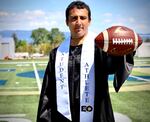Graduation is surreal for many university students this year.
They started out with a normal freshman year — living in dorms, making new friends, participating in on-campus clubs and jobs — only to have the past two years severely disrupted by the pandemic.
For some students, that led to struggles with mental health, social isolation, lost income, and food and housing insecurity. Some witnessed firsthand the pandemic’s deadly impact.
Now, those students are finally seeing the light at the end of the tunnel, as they hope for sunshine at their in-person commencement ceremonies — a rarity after modified events for the last few graduating classes.
OPB talked with three students graduating from three different public universities in Oregon about what the past few years have looked like, and what it feels like to have finally made it to graduation.
Citlaly Arroyo-Juarez
Trying on her cap and gown in front of her parents was an emotional moment for Citlaly Arroyo-Juarez.
“My parents sacrificed everything for us, so I think just giving them a little bit of that back and just letting them know that the sacrifices that they made are seen, I’m very grateful for it,” she said.
Arroyo-Juarez is graduating from Portland State University with a degree in criminology and criminal justice. She just started an internship with the Multnomah County Sheriff Department’s parole and probation team, one step toward her goal of becoming an immigration lawyer.
Although she’s excited about what the future holds, Arroyo-Juarez said it took a lot to get to this point.
She is a first-generation college student — neither of her parents nor her immediate family members has college degrees. She’s also the daughter of immigrants; her parents are from Mexico.

Citlaly Arroyo-Juarez stands in front of her favorite mural in Portland State University's La Casa Latina Student Center. Arroyo-Juarez is graduating from PSU this weekend.
Meerah Powell / OPB
Arroyo-Juarez was born and raised in Gresham, and that’s where she’s living now, at her family home. For three years before that, she lived on or near the PSU campus in downtown Portland.
“I definitely had the traditional college experience, especially getting to live right on campus,” Arroyo-Juarez said.
She held multiple jobs on campus including working as a receptionist for PSU’s cultural resource centers, a coordinator of the university’s student ambassador program and a peer mentor.
All of that changed when the pandemic hit. Used to being extremely social and engaged on campus, Arroyo-Juarez began feeling isolated, especially living by herself at the time.
“It put me in a really bad mindset. I was getting really bad anxiety, really just being alone and having to navigate the pandemic all by myself,” she said.
At the same time, a lot was happening with Arroyo-Juarez’s family. She was helping her parents get their U.S. citizenship when her grandmother in Mexico died due to COVID-19.
“The pandemic changed everything, and I think it didn’t really, really hit me until I was one of those people who were losing people due to COVID,” she said. “I had barely started the process for [my parents] to get their citizenship, and I think just the impact of seeing my mother not being able to say her final goodbyes to my grandmother, it just made me doubt a lot. It made me doubt the system and made me doubt me as an individual.”
Arroyo-Juarez said she never really thought about her mental health before the pandemic started. It wasn’t something in her family’s culture that they openly discussed.
“Weeks were going by and, I don’t know, the pandemic was starting to feel more like our new normal for a very long time, so I kept feeling this way,” Arroyo-Juarez said. “I remember it wasn’t until I was actually crying and pleading with my parents that, ‘I think I need help, like professional help,’ is when they were like, ‘Well, then yeah, seek the help that you need.’”

Citlaly Arroyo-Juarez's graduation cap honors her grandmother who died in Mexico due to COVID-19. The artwork is by Mikayla Hernandez.
Courtesy of Citlaly Arroyo-Juarez
She ended up going to therapy, funded by her scholarship at PSU — the Ford Family Scholarship. She says she’s been continuing therapy for the past five months.
Arroyo-Juarez also made another choice to support her mental health. She took the plunge to study abroad in Europe for part of her last year at PSU.
“I could already feel my mood changing, and just, you know, putting myself out there again,” Arroyo-Juarez said.
She said having the opportunity to study abroad gave her the chance to take back some of the confidence the pandemic stripped from her.
“It was a lot of doubting myself and a lot of negative talk to myself, and I think being out there was like, ‘No, you’re doing it, like, you’ve done it. There’s so much more you’re going to do,’ and I think that’s exactly what I needed,” Arroyo-Juarez said.
Graduating is a huge accomplishment for Arroyo-Juarez, but she said it means just as much, if not more, to her family.
“I know it’s silly, just walking across the stage, but I feel like it’s going to be a moment that changes your life forever because you did it,” she said. “You beat the odds as a first-gen, as a woman of color, as a Latina. I just know I’m going to smile so big and cry, and it’s going to mean a lot to all of us.”
Cedric Riel
While some students struggled with school during the pandemic, Cedric Riel increased his workload.
Riel earned three degrees during his four years at Eastern Oregon University — bachelor’s degrees in business and economics, and a master of business administration.
“I don’t know, I just had fun with it,” Riel said. “I took anywhere from 21 to 23 credits probably, average per term, and I was taking a minimum of eight credits each summer, so yeah, I was just trying to move through.”
Riel, who is attending EOU in La Grande on a football scholarship, said he’s used to being busy.
Along with sports, he’s a student trustee on EOU’s Board of Trustees and Director for Financial Affairs for EOU’s student government. He kept all of that going through the height of the pandemic, but shifting away from in-person activities wasn’t easy for him.
“I hate taking classes online,” Riel said. “It was manageable, and I got better at it … but it’s just hard to connect with people. That’s the main thing.”
One thing that kept him going was being able to get outside.
Riel is originally from Kennewick, Washington. His love of skiing and mountain biking and the fact that he got recruited on his football scholarship made going to EOU an easy decision.
“It was a good thing that I was able to compete in sports with football practices and everything, and I think that that was very helpful for me as an individual,” he said.
He started his first year at EOU redshirting on the football team, meaning he practiced but didn’t play in any games. During that same time, Riel also did track, which he said he really enjoyed, but the start of the pandemic put it to a halt.

Cedric Riel is graduating from Eastern Oregon University with three degrees. During the height of the pandemic he focused hard on school work when competitive sports came to a halt.
Courtesy of Cedric Riel
“My time trials and practice were faster, everything was faster. I was hitting the hurdles better,” Riel said,” and then, you know, Spring 2020 rolls up and our first meet got canceled I think three days in advance.”
The football season was also paused that year, but Riel said the university allowed athletes to maintain their scholarships.
Riel ended up dropping track to focus solely on football when the season restarted last year.
“I came here to play football, and that’s definitely where my passion lies, so that’s what I chose,” he said. “But it was kind of hard to drop track like that, to go from thinking you’re going to compete … to just kind of losing out on that opportunity.”
In the time when the pandemic suspended competitive sports, Riel said he put all of his focus on school.
With the number of credits he completed, Riel said he could have walked in last year’s commencement for his business degree, but he said the fact that it was not a full, traditional in-person ceremony made him decide to hold off until he finished all of his schooling this year.
“I just wanted to wait until I could have an actual commencement, so to be able to have that opportunity for me personally, it’s really exciting,” he said.
Riel said his younger brother graduated high school two years ago, and he had to do a drive-through graduation. He also attended EOU’s commencement ceremony last year as the student trustee on the board. That was also a drive-through ceremony.
“It was cool to see a lot of the students, but there just wasn’t as much connection. Students weren’t able to connect with each other the way you would in a traditional ceremony … Not everyone sees everyone walk the stage, which is a significant part of commencement,” Riel said. “And I’m thankful that I have the opportunity to graduate as I expected to at the end of four years, and to be able to celebrate as I would like to.”
After graduation, Riel will start working at Lamb Weston, a food processing company in Boardman, as a team production leader. He says what he’s looking forward to most is working directly with people.
Andrea Crane
Andrea Crane just recently started her first “big girl job,” as she calls it. She’s a clinic service specialist at Legacy Health. But she says getting there wasn’t easy.
She’s reflecting on that as she’s set to walk in Western Oregon University’s commencement ceremony this weekend.
“Looking back now, it’s kind of bittersweet,” Crane said about her time in college. “It also just feels so liberating to be done … then also just what this stands for for my family.”
Crane grew up in Portland, and she’s living with her family there now. She says even as a teenager, she was always one of her family’s main providers.
“Growing up, there was a lot of stuff going on in my family, and I was one of the first generations to really break a lot of the cycles of abuse … drug addiction, narcissistic abuse, emotional abuse, that kind of stuff,” Crane said. “We were extremely poor, so from 16 I worked full-time in high school. That translated into college, and so being that person in my family it’s like, ‘Oh, I have the answer,’ or ‘I can find the answer,’ because I wasn’t on drugs, or something else crazy.”
But, during the height of the pandemic, Crane was away at WOU, living in Monmouth. She said it was difficult being away at such a tough time.
“When the pandemic hit, I was living separate from my family, so obviously I wasn’t directly providing support, but it was really hard because for the first time in so long, I didn’t have the answers, and I couldn’t — if my family needed it — I could not provide for them because I couldn’t provide for myself,” she said.
The pandemic cost Crane her job in Monmouth — a restaurant that closed during the height of the pandemic. She was one of many people who didn’t get unemployment payments for months.
“I think it was like four or five months, and the day I went back to work, [...] the checks were in the mail,” she said.
Crane also dealt with food insecurity and ended up going to the food pantry on campus.
She did have some money saved up, and she said she was able to pay her rent and other bills using some savings and the leftover money she had from loans she took out for school expenses.

Andrea Crane stands in front of her workplace. Crane is walking in Western Oregon University's commencement ceremony this weekend.
Meerah Powell / OPB
On top of the financial hardship that many people were dealing with through the pandemic, Crane was struggling to maintain her mental health.
Crane had a roommate at the time, though she said he was usually not around, so she dealt with a lot of loneliness. She watched as many other students left campus to move back to their childhood bedrooms. Crane didn’t feel like she could do that.
“There just wasn’t the ability for me to,” she said. “It wasn’t just school. It was my job that was in Dallas, next to Monmouth, my apartment, everything. That was my life at that point. I had no intention of moving back to Portland.”
That was until a family emergency made it a necessity.
Crane’s younger sister was in an accident in May of 2021, and Crane said she didn’t think twice about moving back home to be with her.
The decision to return home kept Crane from graduating last spring. She ended up taking another term online at WOU and completed her degree in the fall in public health education.
She says returning to Monmouth for in-person graduation brings up a mix of emotions.
“It’s honestly kind of like grieving a little bit,” Crane said. “I was already grieving just, you know, that moment in my life — my undergraduate campus life — like being able to really make connections with people my age that a lot of people who are older are like, ‘These are my lifelong friends,’ feeling like just when I was doing that, kind of having that taken away from me was really hard to come to terms with.”
Even with commencement right around the corner, Crane said as the first person in her family to graduate from college, the pandemic created additional barriers. While Crane has a job lined up, she says the pandemic didn’t make the post-college job hunt any easier.
“I thought it would be easy to get a job. I have a degree — that’s what they tell you [you need],” she said. “On my Indeed page I had applied to like 156 positions and had over 50 interviews, and I only got one offer. … I am very happy with this, but I still can’t help but be a little bitter about that.”
Crane said for students who graduated in the past few years, many feel like they did not have a shot at the opportunities they could have due to the pandemic, especially first-generation students.
“I feel like we’re just completely blocked out of the job market … I know people who had no internship at all, and for the first generation experience, I did not have the luxury of being able to do a ton of extracurricular activities. I couldn’t do a whole lot of research stuff because I had to work because I had to provide for myself,” she said.
Still, she said, with struggling through the last couple of years, Crane said being able to actually walk in her graduation ceremony feels like “a little, tiny, baby cherry on top.”
